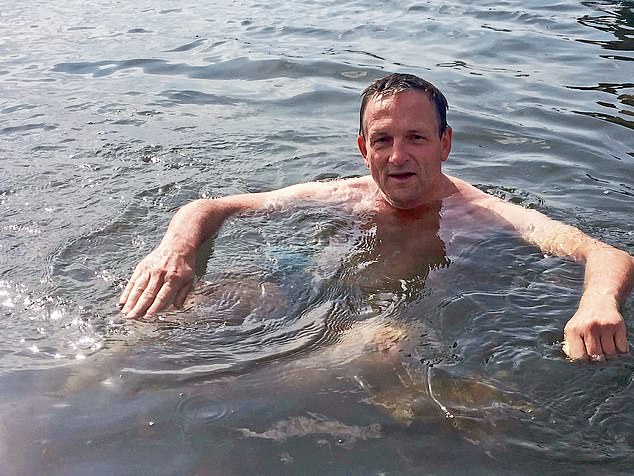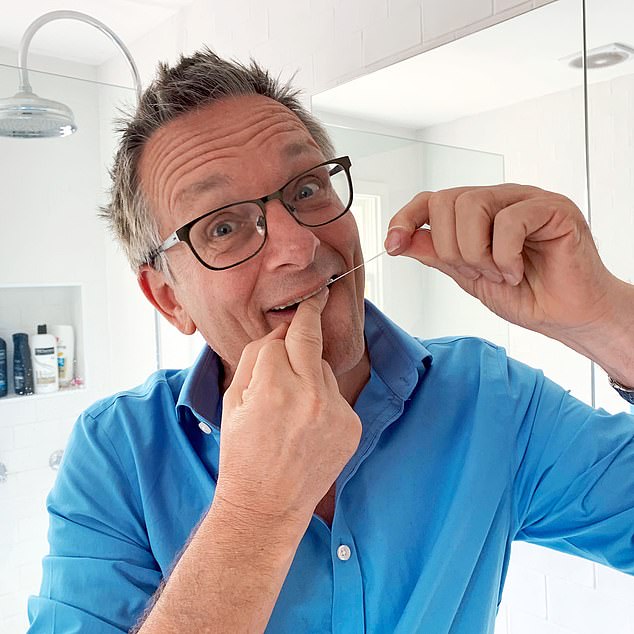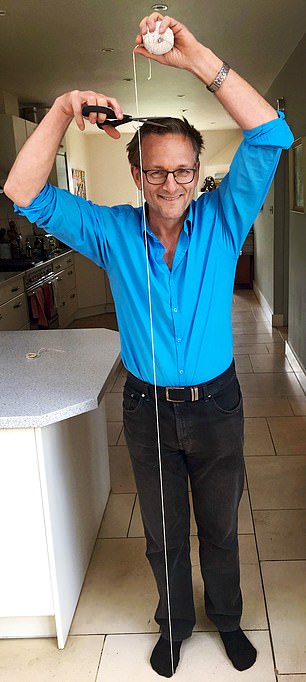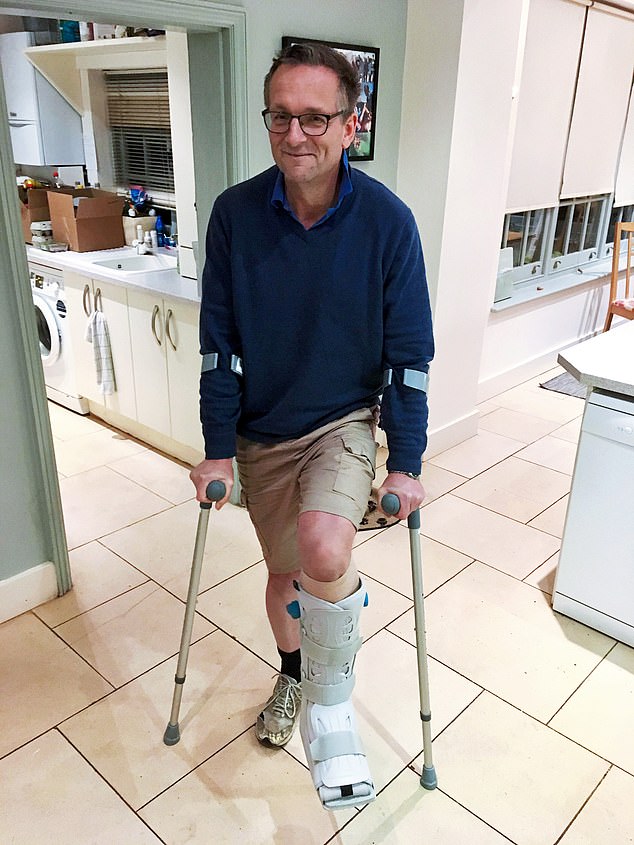How can I stop forgetting my passwords? Does gum disease really cause heart attacks? DR MICHAEL MOSLEY answers your burning questions

Dr Michael Mosley answers your most burning questions
Over the past 18 months, since I first began writing my Mail on Sunday column, I have covered a huge range of subjects, from the best ways to age-proof your heart, brain, joints, skin and eyes, to the latest ways to fight diabetes and rejuvenate your sex life.
Where possible I try to find evidence-based alternatives to medication because I firmly believe that this is the best way to go.
After all, few of us really want to be popping pills every day for the rest of our lives.
In response to what I’ve written, I have received thousands of letters and emails asking a wide range of questions. Sometimes I know the answers, often I don’t.
I love being challenged, and so I’ll scurry off to look up the research and make contact with a variety of experts around the world who are generous enough to share their knowledge. Often, you want to know about diet, exercise, weight loss and, of course, intermittent fasting – and the 5:2 diet.
That said, the articles I wrote about the benefits and risks of cold-water swimming created a lot of interest. There was particular concern when I wrote about swimming in the sea off the coast of Cornwall, and then completely losing my memory. It is a fairly rare condition called transient global amnesia, which affects a few thousand people in the UK every year, normally triggered by a sudden change in temperature or acute emotional distress. The good thing is it lasts 24 hours, rarely re-occurs and I have made a full recovery. In fact, I went swimming in the sea a few weeks ago and was fine.
I wish I could answer all of your letters. But below are a few I’ve picked out which will hopefully be of general interest. Do keep those questions coming…!
Can I have a coffee with my 16:8 diet?
Q: I have been trying 16:8 intermittent fasting – I eat dinner at 8pm, skip breakfast and have lunch at midday. I do have a coffee with milk in the morning. Does this break the fasting period? Also, would it be effective to do the 16:8 for two days a week, or does it have to be a way of life?
A: The 16:8 regime is also known as time-restricted eating. It means eating all your calories within an eight-hour window.
I have written extensively about it in my recent book, The Fast 800.
The benefits of time-restricted eating arise from extending your overnight fast from the normal ten hours – people often have a late- night snack, go to sleep, when obviously no eating gets done, then have breakfast soon after they wake up – to 14 hours or longer.
By doing so, it’s thought that your body goes into fat-burning mode, plus you switch on a process called autophagy, where the body gets rid of old, non-functioning cells.
The main scientist behind time-restricted eating is Professor Satchin Panda, of the Salk Institute in California.
When I asked him about having tea or coffee he said that was fine, even with a spot of milk but don’t have a latte or cappuccino.
He also thinks that for most people 14:10 (extending your overnight fast to 14 hours) is more achievable than 16:8. He recommends you see it as a way of life, and aim to do it five to six days a week.
If you have a late night on Saturday and finish eating and drinking about 11pm then add 14 hours to that and have your next meal at 1pm.

There was particular concern when I wrote about swimming in the sea off the coast of Cornwall, and then completely losing my memory. It is a fairly rare condition called transient global amnesia, which affects a few thousand people in the UK every year, normally triggered by a sudden change in temperature or acute emotional distress
I can’t remember my passwords
Q: I am hopeless at remembering passwords and always seem to be locked out of my phone or bank account or emails. Do you have any advice for boosting memory?
A: Some years ago I entered the World Memory Championships. As part of my training I learnt all about studying effectively. Here are six tips I found helpful:
1: Say whatever it is you’re trying to learn, such as a password, out loud. For some reason that helps.
2: Test yourself – 15 minutes after you’ve memorised a password, write it down or say it again, and then again 15 minutes later. Then do it again after a couple of hours. Then again the following morning.
3: Sleep is essential for consolidating memory in general, so make sure you get enough rest, especially if you’re trying to learn something.
4: Walk or run every day. Exercise is great for consolidating memories.
5: If you are trying to memorise something quite in-depth, such as a speech, create flashcards on which you write down key definitions, quotes and formulas. Use them as reminders to test yourself.
6: Create mind maps as a way of representing information visually. An example is how to remember a shopping list of a loaf of bread, a bunch of bananas and two tins of beans. Imagine a man going to the shops. On his head is a loaf of bread, round his neck a bunch of bananas and in each hand, he’s holding a tin of beans.
Are my bad teeth affecting my heart?
Q: For four years I’ve suffered with my teeth. I’ve had crowns, implants, all sorts. Then last November I was diagnosed with chronic pericarditis after suffering worsening chest pain.
Having read your article about the link between dental health, inflammation and heart health, I asked my dentist if my teeth could be causing my heart issue. She was confident it wasn’t.
Is there a test or scan my doctors should be giving me but aren’t?

There is an emerging theory that the bacteria that cause gum disease may also play a role in a number of major health problems, including heart disease and Alzheimer’s
A: Pericarditis is inflammation of the pericardium – the fibrous bag that surrounds your heart. It can occur after a viral or bacterial infection, or following a heart attack. But often the cause is unknown.
There is an emerging theory that the bacteria that cause gum disease may also play a role in a number of major health problems, including heart disease and Alzheimer’s.
Some scientists it’s because this bacteria has also been found in brain and heart tissue samples of people who have died of these illnesses. We don’t know for sure if that bacteria has caused illness in these people but there is a theory they cause inflammation and this ultimately compromises the function of these vital organs.
We can’t say for sure that gum disease leads to heart problems or dementia. It could be vice-versa.
All we know at the moment is that the bacteria does seem to co-exist in the teeth and other organs.
Irrespective of any link, it is a good idea to keep your teeth healthy.
I’m worried i’ll be allergic to flu jab
Q: I am scheduled to have my flu jab in the coming month. I’m worried as I suffer from lots of allergies and have heard it can interact badly with some. Is this true?
A: The only possible risk I can see is if you have had a severe anaphylactic reaction to eggs: in this case you will be given your flu vaccine in hospital and it will be a special low egg content one.
Anyone else, even with a mild egg allergy, should be able to have the vaccine this year at your doctor’s surgery.
This year’s flu vaccines include an egg-free one known as QIVc. Surgeries should have this, just make sure you inform the nurse or doctor at your appointment.
I can’t get to sleep until early hours
Q: I have always been a very good sleeper but I now can’t get to sleep until the early hours, which means I am exhausted when I wake up for work. Do you have any tips for tiring myself out?
A: Sleep is a subject I am passionate about, as I have struggled with my own nightly routine.
I wake up at about 3am – normally to go to the loo, one of the curses of being over 60 – and then find it hard to nod off.
There are standard things such as reducing your caffeine intake and cutting down on alcohol.
It is also a good idea to try to wake up at the same time every morning, even at the weekends, as creating a routine helps.
Finishing your evening meal three hours before you head to bed is good, as well as having a hot bath before bedtime.
By stopping eating earlier and having a soak you will trigger cooling mechanisms in the body. Falling body temperature is a driver of sleep.
Overweight? My BMI is 24…

Quick test: Is your waist circumference more than your height? Time to lose weight
Q: I’m South Asian but I was adopted by an English couple at six weeks and have followed an English diet. At 54, I thought my body mass index – at 24 – was healthy. But I’ve been diagnosed with high cholesterol and told to lose weight. Is that right?
A: No one knows why, but people with South Asian backgrounds are thought to be more prone to accumulating fat around the gut, which increases the risk of high blood pressure, diabetes and heart disease.
This is irrespective of overall weight. Having a BMI of 24 would be considered healthy for someone who was Caucasian.
But according to the NHS, black, Asian and other minority ethnic groups with a BMI of 23 or more have a higher chance of getting type 2 diabetes and other long-term illnesses.
You can calculate your BMI online at nhs.uk. Or a quick way to test if you’re too big round the middle is to make sure your waist circumference is not greater than half your height. You can use a piece of string to measure this.
Is it dangerous to drink raw milk?
Q: Are there any health benefits – or indeed risks – to drinking raw milk instead of pasteurised?
A: Before we had pasteurisation – heat processing that kills off harmful bugs in food – all milk was consumed raw.
The problem was that it could, and did, kill people, because lots of nasty pathogens can be found living in milk, which cause food poisoning and worse. There are still health risks to drinking raw milk.
You should avoid it if you are pregnant or have a weakened immune system. So what about the benefits?
I’m a big fan of drinking milk – whole is best, as it tastes the nicest, it’s richest in nutrients and the small amount of fat helps curb hunger pangs that cause us to snack.
I could find no evidence that raw milk is any richer than pasteurised milk when it comes to vitamins or minerals.
Fans claims it is better for people with lactose intolerance but in a study researchers found no differences.
Have I got runner’s knee by walking?
Q: I recently completed a 100-mile walk . By the end I had a pain on the outside of my right knee. A friend said it could be ‘runner’s knee’. Can you get it from walking?

I’ve had my fair share of sporting injuries, including rupturing my Achilles earlier this year and a couple of weeks ago my hamstring. Seeing a physio for exercises to build the muscles and protect the knee can help prevent future damage
A: Runner’s knee is a term used to describe pain around the kneecap. It is known as runner’s knee because it typically affects runners but any activity that repeatedly stresses the joint can cause inflammation.
Reasons for continuing pain can include damage and irritation to the soft tissue, the cartilage, or strained tendons.
If the pain continues, it might be worth seeing your GP. They will examine the knee to see if it is still hot, swollen or causing distress.
Unless something serious is going on, like the joint locking, your doctor will almost certainly recommend rest, ice, compression with a support bandage, and elevation – keeping the leg raised. This can help reduce the pain and swelling.
I’ve had my fair share of sporting injuries, including rupturing my Achilles earlier this year and a couple of weeks ago my hamstring. Seeing a physio for exercises to build the muscles and protect the knee can help prevent future damage.
- The health advice on these pages should be taken only in a general context. Dr Mosley can’t give personal replies. If you have a question about your health, speak to your doctor.
